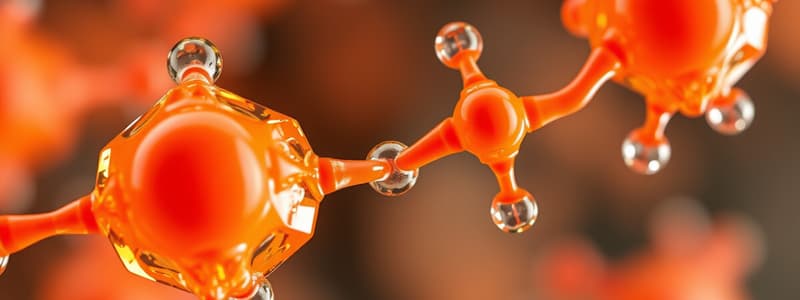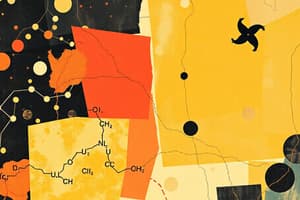Podcast
Questions and Answers
What is the composition of a triglyceride?
What is the composition of a triglyceride?
- 1 glycerol and 2 fatty acids
- 1 fatty acid and 1 glycerol linked by ester bonds
- 4 fatty acids attached to glycerol
- 3 fatty acids linked to glycerol (correct)
Which statement accurately describes saturated fatty acids?
Which statement accurately describes saturated fatty acids?
- They are mainly found in plant oils.
- They contain one or more double bonds between carbon atoms.
- All carbon-carbon bonds in their chains are single bonds. (correct)
- They are typically liquid at room temperature.
What distinguishes unsaturated fatty acids from saturated fatty acids?
What distinguishes unsaturated fatty acids from saturated fatty acids?
- Unsaturated fatty acids are always solid at room temperature.
- Unsaturated fatty acids have 1 or more double bonds in their chains. (correct)
- Unsaturated fatty acids have longer hydrocarbon chains.
- Unsaturated fatty acids have no double bonds.
How do triglyceride molecules behave when placed in water?
How do triglyceride molecules behave when placed in water?
What is true about the fatty acids in a triglyceride?
What is true about the fatty acids in a triglyceride?
What are the main components of a nucleotide?
What are the main components of a nucleotide?
Which of the following sugars is found in RNA but not in DNA?
Which of the following sugars is found in RNA but not in DNA?
How do nucleotides link together in nucleic acids?
How do nucleotides link together in nucleic acids?
What distinguishes a nucleotide from a nucleoside?
What distinguishes a nucleotide from a nucleoside?
In which direction do nucleic acids grow during polymerization?
In which direction do nucleic acids grow during polymerization?
Which of the following correctly pairs a component of a nucleotide with its identity?
Which of the following correctly pairs a component of a nucleotide with its identity?
What characterizes RNA compared to DNA at a structural level?
What characterizes RNA compared to DNA at a structural level?
Which component of nucleotides is involved in forming the structural backbone of a nucleic acid strand?
Which component of nucleotides is involved in forming the structural backbone of a nucleic acid strand?
Which sugar is found in RNA?
Which sugar is found in RNA?
Which base is present in RNA but not in DNA?
Which base is present in RNA but not in DNA?
What is the primary structural difference between starch and cellulose?
What is the primary structural difference between starch and cellulose?
Which component holds the two strands of DNA together?
Which component holds the two strands of DNA together?
What distinguishes a purine from a pyrimidine in genetic material?
What distinguishes a purine from a pyrimidine in genetic material?
In what way do carbohydrates and fats differ in their energy storage capabilities?
In what way do carbohydrates and fats differ in their energy storage capabilities?
What type of molecule is ribose classified as?
What type of molecule is ribose classified as?
What structural characteristic do all living things share regarding their chemical components?
What structural characteristic do all living things share regarding their chemical components?
What is the primary function of structural proteins?
What is the primary function of structural proteins?
Which of the following statements accurately describes membrane transporters?
Which of the following statements accurately describes membrane transporters?
Which type of protein determines the rate of gene expression?
Which type of protein determines the rate of gene expression?
What is a characteristic feature of fibrous proteins?
What is a characteristic feature of fibrous proteins?
What is the primary role of hemoglobin in the body?
What is the primary role of hemoglobin in the body?
Which of the following best describes the basic building blocks of proteins?
Which of the following best describes the basic building blocks of proteins?
What role do signaling proteins play in the body?
What role do signaling proteins play in the body?
What are the polypeptide molecules in proteins primarily composed of?
What are the polypeptide molecules in proteins primarily composed of?
What defines a protein's tertiary structure?
What defines a protein's tertiary structure?
What type of protein structure is characterized by hydrogen bonds across multiple chains?
What type of protein structure is characterized by hydrogen bonds across multiple chains?
Which of the following is true about quaternary structure in proteins?
Which of the following is true about quaternary structure in proteins?
What is the primary factor that drives the final folding of a protein?
What is the primary factor that drives the final folding of a protein?
What distinguishes the quaternary structure from the tertiary structure of proteins?
What distinguishes the quaternary structure from the tertiary structure of proteins?
Which model best explains the role of side groups in protein folding?
Which model best explains the role of side groups in protein folding?
What happens when proteins are denatured?
What happens when proteins are denatured?
What is a defining characteristic of a β-pleated sheet structure?
What is a defining characteristic of a β-pleated sheet structure?
Flashcards are hidden until you start studying
Study Notes
Fatty Acids and Glycerol
- Triacylglycerol (triglyceride) consists of three fatty acids linked to glycerol via ester linkages formed through dehydration synthesis.
- Fatty acids in a triglyceride can vary and are often not identical.
- Triglycerides are non-polar and insoluble in water, leading them to clump together when placed in aqueous environments.
Types of Fatty Acids
- Saturated fatty acids have all single bonds between carbon atoms in their hydrocarbon chains, fully saturated with hydrogen atoms.
- Unsaturated fatty acids contain one or more double bonds in their hydrocarbon chains.
- Animal triglycerides typically consist of long-chain saturated fatty acids, remaining solid at room temperature.
- Plant and fish oils usually contain short-chain unsaturated fatty acids, remaining liquid at room temperature.
Nucleic Acids (DNA and RNA)
- Nucleic acids are polymers essential for the storage, transmission, and usage of genetic information; two types exist: DNA (deoxyribonucleic acid) and RNA (ribonucleic acid).
- Nucleotides, the monomers of nucleic acids, comprise a pentose sugar, a phosphate group, and a nitrogen-containing base.
Nucleotides vs Nucleosides
- Nucleotides consist of three components (pentose sugar, phosphate group, nitrogen base) while nucleosides have only two (pentose sugar and nitrogen base).
- RNA contains ribose while DNA contains deoxyribose.
- Nucleotides are linked through phosphodiester linkages connecting carbon 3' in one sugar to carbon 5' in another, and nucleic acids grow in the 5' to 3' direction.
Differences Between DNA and RNA
- DNA bases: Adenine, Guanine, Cytosine, Thymine; RNA bases: Adenine, Guanine, Cytosine, Uracil.
- DNA contains deoxyribose; RNA contains ribose.
- DNA is double-stranded, while RNA is single-stranded.
- DNA allows base-pairing, unlike RNA.
Protein Structure and Function
- Proteins are complex molecules composed of chains of amino acids, vital for the structure, function, and regulation of body tissues.
- Proteins serve various functions, including enzyme catalysis, structural support, signaling, and transport within organisms.
Levels of Protein Structure
- Primary structure: linear sequence of amino acids.
- Secondary structure: coiling and folding of polypeptide chains into alpha-helices or beta-pleated sheets due to hydrogen bonding.
- Tertiary structure: overall 3D shape resulting from interactions among side groups; hydrophobic interactions are key in folding.
- Quaternary structure: formation of a functional protein from two or more polypeptide chains; subunits can vary in type and arrangement (e.g., hemoglobin).
Energy and Nutritional Roles
- Fats provide more energy compared to carbohydrates and can serve as energy sources when carbohydrates are unavailable.
- Starch (a branched polymer) is digestible, while cellulose (a linear polymer) is not due to its structural differences.
Summary of Chemical Basis of Life
- All elements consist of unique atoms; only a few are essential for life.
- Chemical compounds formed through atomic bonding are uniform across all living organisms.
Studying That Suits You
Use AI to generate personalized quizzes and flashcards to suit your learning preferences.




